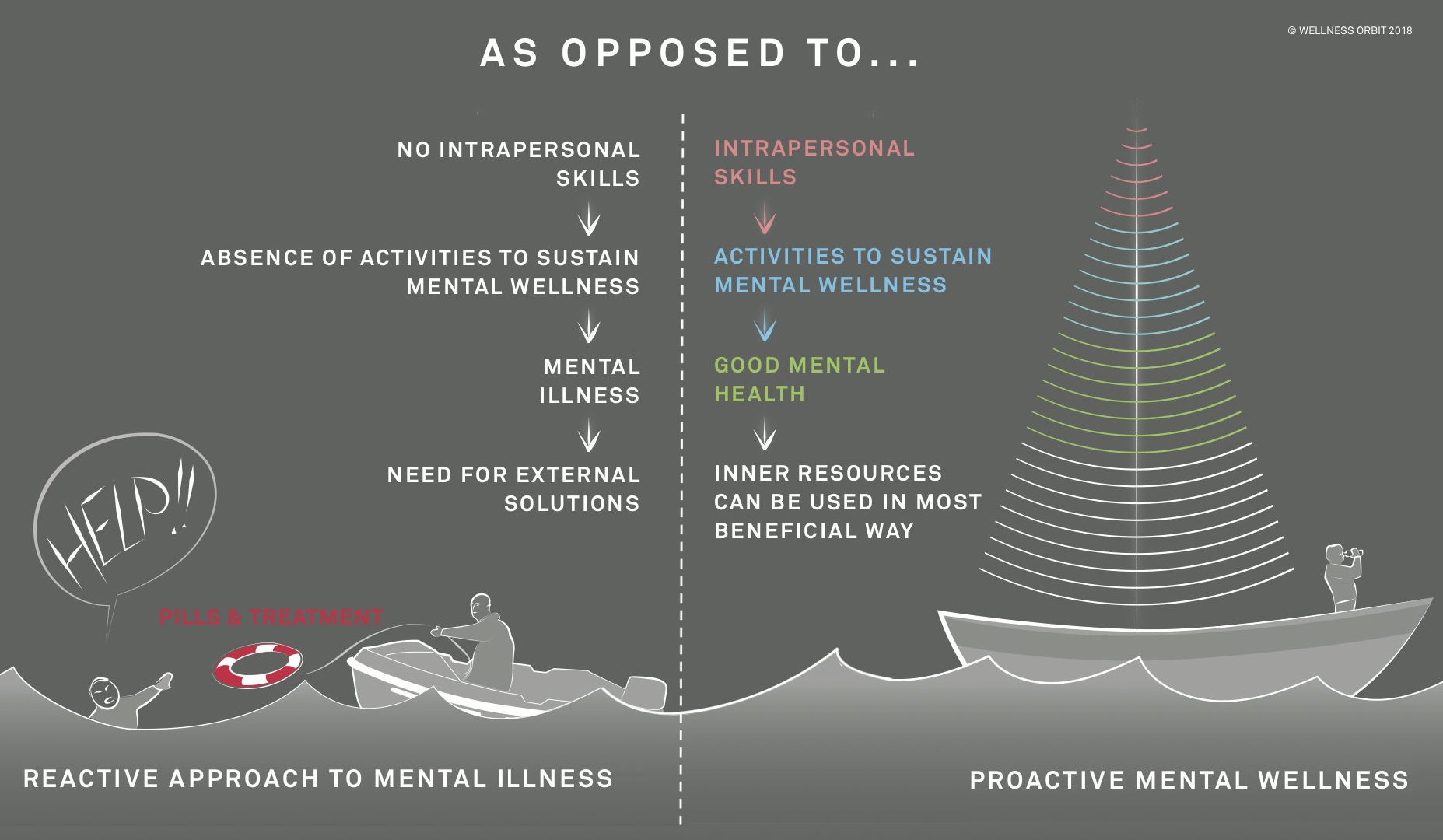Last year Health and Safety Executive in the UK reported that “Stress, depression or anxiety accounted for 57% of all working days lost due to ill health” in the United Kingdom.
This year’s Cigna Report stated: “In the workplace, 87% of workers are stressed, with 12% claiming it as unmanageable.” And that is not all, the same Cigna 360 Well-being survey continued: “91% agree that colleagues’ stress impacts the workplace with a higher degree of negative impacts such as a depressing atmosphere and lowering morale, and yet employers are not doing enough to address the issue. Furthermore, 45% agree that wellness programs focus more on physical rather than mental well-being and tend to be one size fits all when in fact, they need to be tailored specifically to their target staff. This gap should serve as a wake-up call for employers who wish to retain employees, boost morale and increase productivity.”
Looking at those numbers it is very clear that we need a change in all workplaces where people face pressure and stressful situations on a daily bases.
WHAT IS STRESS?
Stress can be defined as the adverse inner reaction that people experience when they come into contact with excessive pressures that they fail to handle. When there is too much outside triggers our own inadequate inner reactions can easily cause us emotional and mental overload. Experiencing this pressure is stress. Feeling it constantly is chronic stress.
No external stress trigger maters without that inner reactivity, as we would not experience it to be a problem. Do you remember any situation where one person has a huge problem and someone else can stay fully calm? The situation is the same, reactivity within two persons is different.
Stress often initiates the “fight or flight” response, a complex reaction of neurologic and endocrinologic systems. When we fight or run away, then we fail to face the actual situation in the present moment. Our response is not adequate and our work and family life both suffer.
WHY IS STRESS A HUGE PROBLEM?
Lets observe to whom stress is biggest problem?
Stress and burnout are the lifestyle choice of successful professionals, executives and entrepreneurs – when you work intensively you come in contact with pressure to perform well on a daily bases. Often those high performing employees and business owners put themselves on the frontline for the success of the organization. Instead of an adequate response, everything turns into a battle. The problem is that those A-team players are not easily replaceable due to their elite practical know-how and therefore cannot give their task to others very easily even if they want to. In practice, several B-level players can never replace a single A-level player fully. At least not right away. It is not only the know-how that matters, but it is also practical experience and personal trust. So, it is natural that such A-players have difficulty to take time off and sleep 8 hours every night. Their work time is booked advance for moths and free time is often extremely limited, so they are the ones who fall into the trap of increasing stress levels and experience burnout more often than others.
Let’s take a practical example. Dan Lukasik wrote here in Thrive Global a while ago that “The ABA study showed that 28% of lawyers had struggled with some kind of depression in the past 12 months of the survey. That is four times the rate found in the general population.” He continued “Even more troubling was the fact that 61% of attorneys surveyed had struggled with depression at some point in their legal careers. That is almost ten times the rate found in the general population.” Similarily medical personnel, teachers and all those who face constant deadlines, work open offices or need to perform difficult tasks are more prone to burnout than those who work in a relaxed atmosphere without strict deadlines and huge workloads.
But is it really because of a lack of time? We all have 24 hours each day, what matters is how we deal with our own inner processes during that 24 h. The lack of time has never been a real problem. The real fundamental problem is our total lack of intrapersonal skills that does not allow us to respond adequately to external situations under pressure.
WHAT ARE INTRAPERSONAL SKILLS?
Intrapersonal skills are based on knowledge and understanding about what goes on inside of us, ‘intra’ meaning inside. Awareness-based intrapersonal skills enable us to lead our three subsystems in an optimal manner: emotions, thoughts, and awareness. Those skills enable us to replace ‘automatic’ subconscious inner reactivity with an adequate and aware response.
WHAT IS MENTAL WELLNESS?
Mental wellness is a level of psychological well-being that secures you a peaceful mind.
Mental wellness is a proactive approach to mental health. Mental wellness at work secures good work results. Mental wellness is related to the quality of life and should not be associated with mental illnesses at all. The most common work-related mental health problems are the result of not having good mental wellness.
Our current education system neglects mental wellness lessons in the educational curricula, so none of us have had proper education about how our inner domain functions and thus we fail to deal with our own inner reactivity. And it is our inner reactivity that causes stress.
Stress is again the main pathway to burnout and burnout again has a huge overlap with depression. We never realize that there is a slow downward spiral as we fail to notice the early warning signs of burnout. And once we reach burnout, depression is often the next phase.
WHY IS IT IMPORTANT FOR YOU?
Until we lack intrapersonal skills, stress will continue to create automatic inner reactvity that can cause severe physical and mental health problems, affecting the quality of our personal and work relations.
While stress and burnout are not mental illnesses, but both those mental health-related issues can easily escalate into mental illnesses. Stress, burnout, anxiety, and depression can also increase the risk of cardiovascular diseases, muscle tension, gastrointestinal illnesses, obesity or bad skin conditions, etc.
Your mental wellness and physical fitness are directly interconnected. When you lose your mental fitness, you become open to many health problems. So learning intrapersonal skills helps you to stay well and avoid all kinds of health problems.
WHY IT MATTERS FOR THE EMPLOYERS?
When we look at it from an employer’s standpoint, then stress and burnout can affect the health of staff, lead to absenteeism and sick leaves, reduce productivity and work engagement, and lead to performance, quality and client relationship problems. Yet many employers do nothing as they lack an efficient proactive approach towards mental wellness at work.

The CIPD Survey Report ‘Health and Wellbeing at Work’ from April 2019 stated “Despite the increased focus on mental health, for example, there is still a lack of preventative measures being taken and despite employers’ efforts we are still seeing a worrying increase in poor mental health and work-related stress. This indicates that the steps taken by employers are falling short of what’s needed. Overall, organisations still tend to take a reactive approach to well-being, rather than a pre-emptive one that aims to create the kind of working environment that supports good well-being and helps to prevent poor health where possible.” It is the proactive/preventative mental wellness approach that distinguishes my practical approach from what others are offering. And I dream that every employer can give their employees access to mental wellness gym training so that people can learn intrapersonal skills and work well without sacrificing their wellbeing and health. You are welcome to test my approach here for free.
WHY WORKPLACES NEED TO FOCUS ON WELLNESS?
As we look for ways to reduce the stigma surrounding mental illness and mental health problems in our workplace, the approach needs to be comprehensive and proactive as there is no stigma attached to mental wellness. It’s important that employees feel comfortable talking about their mental health at work and seek professional help as soon as they notice the problem. Talking about mental wellness and mental fitness matters as much as daring to address any mental health problems very early on.
I see that digital intrapersonal education and at workplaces has the potential to reduce the number of people who feel mentally unwell.


